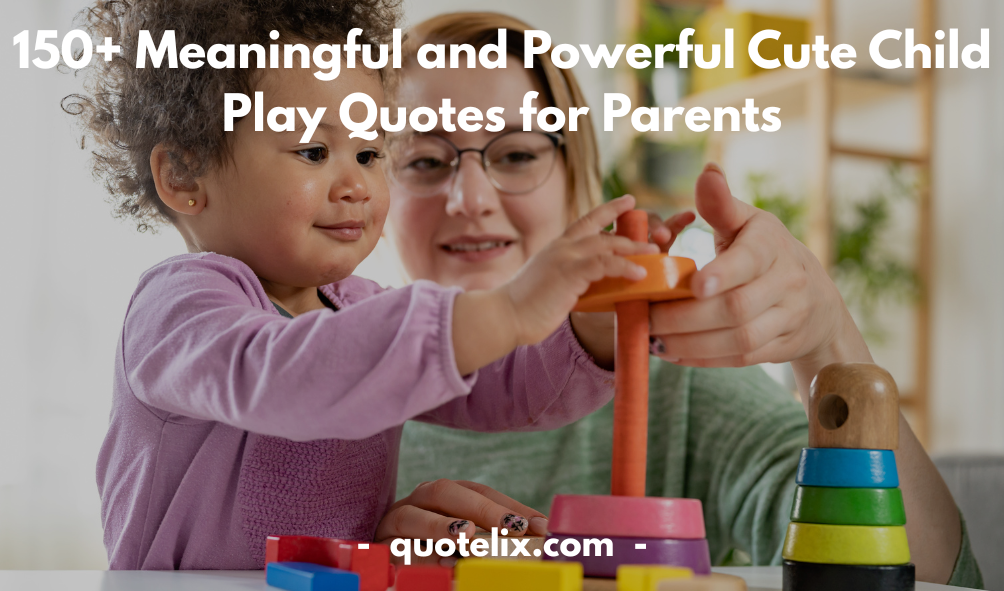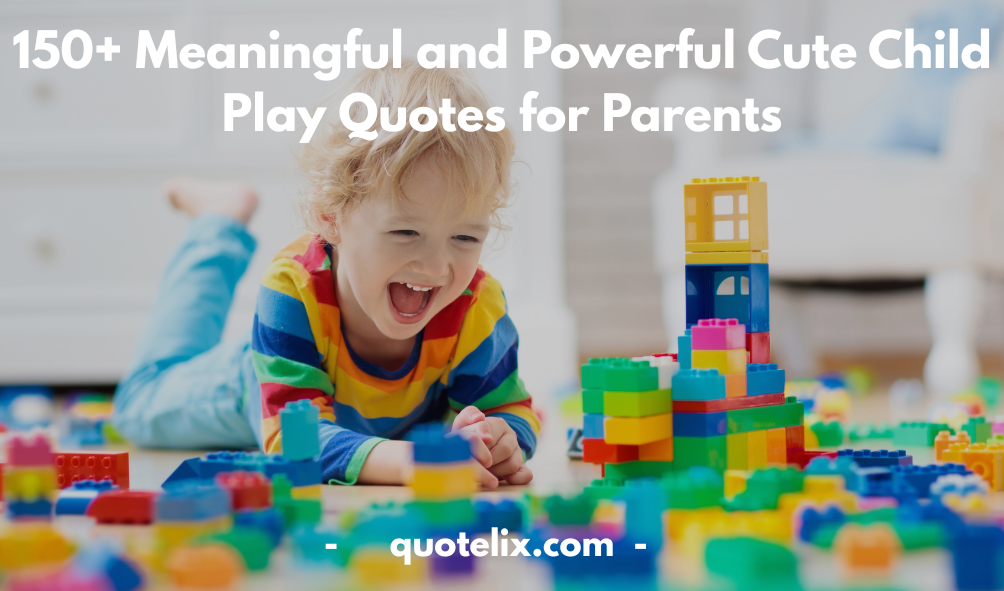Childhood is a magical time, isn’t it? One minute they’re building castles out of cardboard boxes, and the next, they’re having tea with stuffed animals like royalty. These everyday moments hold deep meaning, and when captured in words, they become timeless treasures. That’s exactly what meaningful cute child play quotes do—they remind us that even the smallest giggle or messy finger paint session can be full of life lessons, laughter, and love.
Let’s explore the heart and soul of these charming quotes and how they can bring joy, inspiration, and nostalgia into your world.
The Importance of Play in Childhood Development
- “Play is the work of childhood.” — Jean Piaget
- “Through play, children learn who they are and how they fit into the world.” — Unknown
- “Children learn as they play. Most importantly, in play, children learn how to learn.” — O. Fred Donaldson
- “Play is the highest form of research.” — Albert Einstein
- “The most effective form of learning is when children are having fun.” — Unknown
- “Play is essential to a child’s development. It nurtures the mind, body, and spirit.” — Unknown
- “Play gives children the chance to practice what they are learning.” — Mr. Rogers
- “What children need most is a sense of belonging and a place to play.” — Unknown
- “The more that you read, the more things you will know. The more that you learn, the more places you’ll go. And in play, a child explores all the places in the world.” — Dr. Seuss
- “In play, children’s imaginations flourish and their brains develop faster than in any other part of life.” — Unknown
Imagination and Creativity in Children’s Play
- “Imagination is the beginning of creation.” — George Bernard Shaw
- “Every child is an artist. The problem is how to remain an artist once we grow up.” — Pablo Picasso
- “Creativity is intelligence having fun.” — Albert Einstein
- “In the hands of a child, imagination knows no bounds.” — Unknown
- “A child’s play is a window into their world of imagination.” — Unknown
- “Imagination allows children to take the impossible and turn it into reality.” — Unknown
- “Through play, children can express their creativity in the most uninhibited way.” — Unknown
- “Imagination is everything. It is the preview of life’s coming attractions.” — Albert Einstein
- “Children’s creativity is like an ocean; it’s deep and never runs dry.” — Unknown
- “Let your child’s imagination soar—it’s the foundation for innovation.” — Unknown
The Role of Play in Building Emotional Intelligence
- “Play is not just fun—it’s essential for emotional growth.” — Unknown
- “Children learn about feelings, empathy, and resilience through play.” — Unknown
- “Through play, children learn how to manage their emotions and develop self-regulation.” — Unknown
- “Playing allows children to express emotions that words cannot.” — Unknown
- “Emotions are the hidden language of play.” — Unknown
- “Play helps children process difficult emotions in a safe environment.” — Unknown
- “Emotional intelligence is built during the simple moments of play with others.” — Unknown
- “When children play, they learn to share, take turns, and understand the emotions of others.” — Unknown
- “The emotional bonds formed in play become lifelong connections.” — Unknown
- “Emotional intelligence starts in childhood, with every game, every conversation, every moment of play.” — Unknown
Play as a Form of Learning and Exploration
- “Play is the gateway to learning.” — Unknown
- “Learning is a natural result of play.” — Unknown
- “Through play, children explore the world around them and discover new ideas.” — Unknown
- “The best way for children to learn is by doing, exploring, and playing.” — Unknown
- “Children’s learning is deepened when it’s infused with joy and play.” — Unknown
- “In the sandbox of life, children learn to create their own paths through play.” — Unknown
- “Every game is a lesson in disguise, teaching children about the world and themselves.” — Unknown
- “Play allows children to explore not just the world around them, but their own potential.” — Unknown
- “Exploration through play helps children develop critical thinking and problem-solving skills.” — Unknown
- “The more children play, the more they learn about the world and their place in it.” — Unknown

The Magic of Pretend Play in Child Development
- “Pretend play helps children understand the world by creating their own version of it.” — Unknown
- “Through pretend play, children learn how to be imaginative problem-solvers.” — Unknown
- “Pretend play is a rehearsal for real life.” — Unknown
- “Children’s minds are limitless during pretend play—they can be anything they dream of.” — Unknown
- “When children play pretend, they develop both their creativity and social skills.” — Unknown
- “Pretend play is a playground for the imagination.” — Unknown
- “Through pretend play, children experiment with different roles and build empathy.” — Unknown
- “In the world of pretend play, children have the power to shape their own reality.” — Unknown
- “Pretend play allows children to express emotions and explore different scenarios in a safe space.” — Unknown
- “Every story a child creates in pretend play is a step toward understanding the world and themselves.” — Unknown
How Play Fosters Social Skills in Children
- “In the world of play, children learn the art of sharing, kindness, and communication.”
- “Play teaches children how to work together, solve problems, and create lasting friendships.”
- “Through play, kids practice patience, empathy, and collaboration, which they carry into their adult lives.”
- “Social skills aren’t just learned in classrooms; they’re nurtured in the playgrounds of childhood.”
- “The games children play help them understand the value of teamwork, respect, and trust.”
- “When children play together, they not only have fun but also develop the foundations of lasting relationships.”
- “Play teaches young minds how to negotiate, cooperate, and handle conflict—skills that last a lifetime.”
- “By engaging in group play, children learn the dynamics of give and take, setting the stage for emotional intelligence.”
- “Through unstructured play, children naturally form connections and learn the beauty of inclusion.”
- “Every game a child plays is a lesson in social interaction, fostering the skills needed to navigate the world.”
Play and the Parent-Child Bond
- “Play is the language that connects a parent’s heart to their child’s spirit.”
- “In every game shared, parents build memories that last a lifetime with their children.”
- “The act of playing together strengthens the invisible bond between parent and child, turning moments into lifelong memories.”
- “Parent-child playtime is not just fun; it’s the foundation of trust, love, and understanding.”
- “When parents play with their children, they’re not just having fun—they’re building a deep emotional connection.”
- “Playtime with parents allows children to feel loved, safe, and valued in ways words alone cannot convey.”
- “The joy in a child’s eyes during play reflects the special connection that grows through shared laughter.”
- “Through play, parents can see the world from their child’s perspective, fostering empathy and patience.”
- “The most meaningful moments between a parent and child often happen when they’re simply playing together.”
- “In the world of play, parents and children communicate without barriers, creating a bond that words alone can’t build.”
The Psychological Benefits of Free Play
- “Free play is the playground for a child’s creativity, imagination, and emotional health.”
- “When children engage in free play, they experience a sense of freedom that boosts their mental and emotional well-being.”
- “The beauty of unstructured play lies in its power to nurture a child’s confidence, autonomy, and decision-making skills.”
- “Free play allows children to explore their thoughts and emotions, providing a healthy outlet for stress.”
- “In a world where schedules are rigid, free play offers children the freedom to be themselves and think outside the box.”
- “Free play fosters resilience, helping children develop the mental fortitude to face challenges with confidence.”
- “When children are free to play on their own terms, they learn self-regulation and emotional control.”
- “Unstructured playtime is crucial for children’s mental health, offering a space for them to process their emotions and experiences.”
- “Free play helps children develop critical thinking, creativity, and problem-solving abilities, all of which shape their future success.”
- “The psychological benefits of free play go beyond fun—it’s a critical component of healthy emotional development.”
Fun and Learning: Balancing Education and Play
- “Learning doesn’t have to be a chore; it can be as much fun as a game.”
- “The best education happens when play and learning are woven together in harmony.”
- “Through play, children learn more than facts—they learn how to think, problem-solve, and explore the world.”
- “When play becomes a tool for learning, children retain knowledge while enjoying the process.”
- “The balance of fun and education creates a dynamic where children’s curiosity and creativity are allowed to flourish.”
- “Learning through play makes education feel like an adventure rather than a task.”
- “In the right environment, play and learning are not separate—they are two sides of the same coin.”
- “Playful learning engages the mind, enhances understanding, and strengthens the child’s desire to keep exploring.”
- “Balancing education and play ensures that children enjoy the learning process while gaining the skills they need.”
- “The secret to a child’s love for learning lies in finding fun, interactive ways to educate through play.”
Playful Wisdom: Life Lessons from Child’s Play
- “In the innocence of play, children teach us the value of joy, laughter, and curiosity.”
- “The simplicity of play holds the wisdom of life: be present, enjoy the moment, and share with others.”
- “Children show us that life isn’t about perfection; it’s about embracing each moment with enthusiasm and wonder.”
- “Every game a child plays teaches valuable life lessons, from cooperation to resilience and creativity.”
- “Through play, children remind us that happiness is often found in the simplest of moments.”
- “The wisdom of a child’s play lies in the way it reminds us to stay curious, adaptable, and open-minded.”
- “Play teaches children to embrace failure as a lesson and to always keep trying—skills they carry into adulthood.”
- “The playful nature of children shows us that learning and growing can be an exciting journey full of discovery.”
- “Playtime is full of life lessons: teamwork, patience, and finding joy in the smallest victories.”
- “Through the lens of play, children demonstrate the importance of creativity, imagination, and exploring the unknown.”
The Influence of Nature and Outdoor Play on Children
- “The earth has music for those who listen, and children find their rhythm through outdoor play.”
- “Nature is a playground where children learn the language of the earth.”
- “When children play outside, they are not just building forts—they are building character.”
- “Outdoor play offers children the chance to discover their wild side and nurture their curious minds.”
- “A child’s mind flourishes in the great outdoors, where play and nature collide.”
- “In the wild, every child becomes an explorer and every game is an adventure.”
- “The beauty of nature nurtures the spirit of childhood play in ways that indoor games never can.”
- “Children who play outside grow roots in the earth and wings in their dreams.”
- “Nature is the best teacher; it provides endless lessons, from the tiniest insect to the tallest tree.”
- “The more time children spend in nature, the stronger their imagination and sense of wonder becomes.”
Play and Its Connection to Child’s Self-Expression
- “Through play, children discover the truest version of themselves.”
- “Play is the canvas on which a child paints their dreams and emotions.”
- “When children play, they speak the language of their hearts—pure, honest, and free.”
- “A child’s self-expression is most vivid when they are immersed in creative play.”
- “The toys a child chooses reflect a story, a secret, and a piece of their soul.”
- “In play, children learn to communicate the complexities of their inner world without words.”
- “Every child’s laughter is a brushstroke, every game a masterpiece of self-expression.”
- “Play is the space where children can express what their hearts feel but their words can’t always say.”
- “The power of play lies in its ability to let children be who they truly are—without limits.”
- “Through imaginative play, children unlock the door to their authentic selves.”
Inspirational Quotes About Children’s Imagination
- “Children’s imaginations are the seeds from which the world’s greatest innovations will grow.”
- “Imagination is the key that opens the door to endless possibilities for a child.”
- “A child’s imagination is a magic wand that turns ordinary moments into extraordinary adventures.”
- “Through imagination, children can explore the entire universe without leaving their room.”
- “Every child’s imagination is an infinite canvas waiting to be filled with dreams.”
- “The future belongs to children who believe in the power of their own imaginations.”
- “Imagination in childhood isn’t just for play; it’s the foundation of all creativity.”
- “In the realm of imagination, every child is the hero of their own story.”
- “When children imagine, they become the architects of their dreams and the builders of their future.”
- “Imagination isn’t a luxury for children—it’s their birthright, a bridge to all that is possible.”
The Power of Laughter and Play in Child Growth
- “Laughter and play are the wings that allow children to soar in their development.”
- “A child’s laughter is a sign of growth—an unspoken language of joy and understanding.”
- “In every giggle and playful moment, a child’s mind and heart are flourishing.”
- “When children laugh, they are building resilience, emotional strength, and social bonds.”
- “Laughter is the sound of a child’s spirit expanding as they discover the world through play.”
- “Through play, children not only learn to laugh—they learn to thrive.”
- “The joy of play unlocks a child’s ability to adapt, grow, and become more confident.”
- “A playful heart is a healthy heart—laughter is a child’s medicine for growth.”
- “In the world of play, laughter becomes the thread that ties a child’s emotional well-being together.”
- “Children who laugh and play grow with the power to face life’s challenges with a smile.”
How Play Affects Cognitive Skills in Children
- “Play is the best classroom for a child’s developing brain, where learning happens without effort.”
- “Through play, children strengthen their cognitive skills, laying the foundation for lifelong learning.”
- “Every game a child plays is a building block that strengthens their brain and sharpens their mind.”
- “Cognitive development in children thrives when they engage in play that challenges and excites them.”
- “Play is the playground where young minds stretch their imaginations and grow their intelligence.”
- “The brain of a child is most active when they’re playing, making every moment a valuable lesson.”
- “By solving problems in play, children sharpen their reasoning, memory, and critical thinking skills.”
- “Through interactive play, children develop the mental flexibility needed to adapt and succeed.”
- “Play is the pathway to a child’s cognitive success, where curiosity meets creativity.”
- “Every time a child plays, they are exercising their brain, preparing themselves for the challenges of tomorrow.”
Playful Moments: Celebrating Innocence and Joy
- “A child’s laughter is the music of innocence and joy.”
- “The most joyful moments are the ones spent in pure, playful freedom.”
- “Play is the celebration of life through the eyes of a child.”
- “In every giggle, a child writes a new story of happiness.”
- “Play isn’t just an activity; it’s a way to soak in the magic of childhood.”
- “Joy is found in the simplest of things—a swing, a jump, a laugh.”
- “A child’s play is a masterpiece of joy, painted with innocence.”
- “Through play, children create a world where joy knows no limits.”
- “The innocence of a child at play is a reminder that happiness is simple.”
- “Every playful moment holds a spark of pure joy—let it shine.”
The Role of Play in Fostering Empathy in Children
- “Through play, children learn to understand and share the feelings of others.”
- “A child who plays is a child who grows in empathy.”
- “In the sandbox of play, children plant seeds of kindness and compassion.”
- “Play teaches children that empathy begins with listening to each other.”
- “When children play together, they learn how to support, share, and care.”
- “Through role-play and imagination, children discover the power of empathy.”
- “A playful heart leads to an empathetic soul.”
- “Play isn’t just fun; it’s a classroom for teaching empathy and understanding.”
- “The art of empathy is learned not through words, but through shared play.”
- “In the world of play, children find the beauty of seeing life through others’ eyes.”
Childhood Games and the Sense of Belonging
- “In every game, a child finds a place to belong.”
- “Through childhood games, children learn that connection is built on shared experiences.”
- “The best games are the ones that create bonds that last a lifetime.”
- “When children play, they discover not just fun, but a sense of belonging.”
- “Games are the ties that bind friendships in the playground of life.”
- “The joy of a childhood game isn’t just in the play; it’s in the people you share it with.”
- “Play isn’t just about winning; it’s about feeling part of something bigger.”
- “Through games, children learn that belonging is not about fitting in, but about being seen and valued.”
- “In the laughter of a game, children find the heartbeats of friendship.”
- “Childhood games are the foundation of lifelong connections and memories.”
Child Play and the Development of Problem-Solving Skills
- “Through play, children become the architects of their own solutions.”
- “Every game a child plays is a lesson in problem-solving.”
- “Play builds more than just fun; it builds critical thinking skills.”
- “When a child faces a challenge in play, they also unlock their inner problem-solver.”
- “Play is the playground where young minds stretch and strengthen their problem-solving muscles.”
- “In every puzzle and game, children discover the joy of overcoming obstacles.”
- “Children who play learn how to think, strategize, and conquer challenges.”
- “Each game teaches children that challenges are just opportunities in disguise.”
- “Childhood play sharpens the mind, turning every obstacle into a chance to grow.”
- “The best problem solvers are those who’ve mastered the art of playful thinking.”
The Value of Unstructured Play in Child Development
- “Unstructured play is the canvas on which children paint their creativity.”
- “In the absence of rules, children discover the freedom to explore and grow.”
- “Unstructured play is where imagination takes flight and boundaries fade away.”
- “Children who play without a script learn how to write their own stories.”
- “The value of unstructured play is immeasurable—it’s the fuel for a child’s creativity.”
- “Through free play, children learn to invent, create, and push the limits of possibility.”
- “Unstructured play is the foundation for every great idea a child will ever have.”
- “In a world of unstructured play, children build the skills of independence and resilience.”
- “When children are free to play without limits, they unlock their full potential.”
- “The beauty of unstructured play lies in its ability to teach life’s greatest lessons without saying a word.”
The Emotional Impact of Child Play Quotes
How They Spark Nostalgia
For adults, quotes about child play often stir emotions. They remind us of our own childhoods, of simpler times, scraped knees, and sunlit afternoons.
“Somewhere in your heart, that playful child still lives.”
Healing Power of Play-Inspired Words
Words have power—and these ones can heal, uplift, and comfort. Whether you’re a parent grieving lost time or someone healing your inner child, play quotes help bridge the gap.
Crafting Your Own Child Play Quotes
Tips for Writing Meaningful Lines
You don’t need to be a poet. Just notice the beauty. Watch your child twirl, build, giggle, and run—then describe that feeling.
- Focus on emotions, not just actions.
- Keep it short and sweet.
- Use sensory details: sounds, sights, textures.
Real-Life Moments That Inspire Quotes
That rainy day puzzle. The backyard bug hunt. The whispered secrets between siblings. Real life is full of quote-worthy magic—you just have to catch it.
Cultural Views on Children and Play
Universal Themes in Child Play Quotes
Across the globe, play is a shared language. From mud kitchens in Kenya to street games in Brazil, kids everywhere know the joy of make-believe.
Unique Expressions Around the World
Japanese haikus, African proverbs, Native American stories—many cultures express the value of childhood through poetic phrases. Each adds depth to our understanding of play.
Child Play Quotes in Social Media and Art
Trending Hashtags and Captions
Quotes make perfect Instagram captions. Try pairing a photo with:
- “Wild and wonderfully messy.”
- “Play hard, nap harder.”
- “Their world is full of wonder—and so is mine when I watch them.”
Making Shareable and Aesthetic Content
Use quotes on Pinterest boards, wall decals, printable posters, and even t-shirts. Words + visuals = a powerful way to connect with others.
Quotes that Encourage Outdoor Play
Reconnecting Kids with Nature
Today’s kids need a little nudge to get outside. These quotes can help:
“Dirt under nails, wind in hair—that’s where childhood grows best.”
“Let them chase butterflies and forget the clock.”
Celebrating Muddy Shoes and Sunny Skies
“Muddy footprints are love notes from the earth.”
“Let the sun kiss their cheeks and the grass tickle their toes.”
Spiritual and Mindful Quotes about Child Play
Zen and Peace in a Child’s Laugh
Play is presence. A child lost in play is mindfulness in motion.
“In their giggle, there is peace.”
“Watch them play—it’s a meditation.”
Play as a Form of Mindful Living
“Play isn’t a break from life. It’s the heart of it.”
“Children don’t rush. They dance through time.”
Conclusion
There’s something powerful about capturing a fleeting moment in just a few words. Meaningful cute child play quotes do just that—they wrap up all the giggles, dirt-streaked cheeks, wild imaginations, and unconditional love of childhood into tiny, unforgettable packages. Whether you’re a parent, teacher, artist, or just someone who remembers the joy of childhood, these quotes are your invitation to slow down and smile.
After all, life’s biggest lessons often come from the tiniest humans, especially when they’re busy at play.
FAQs
What Makes a Good Quote for a Child’s Memory Book?
Look for words that are short, heartfelt, and paint a picture. Bonus points if it makes you smile or tear up a little.
Can Quotes Help Kids Value Playtime More?
Absolutely. Displaying quotes teaches kids that play is important, and their creativity is something to cherish.
Are Quotes Useful in Early Education?
Yes! Quotes inspire imagination, build emotional literacy, and make classrooms feel warm and welcoming.
Can I Use These Quotes on Social Media?
Definitely. Just make sure to pair them with authentic photos or moments to enhance connection.
Where Can I Find More Meaningful Quotes?
Books by educators, Pinterest boards, parenting blogs, and—sometimes—the spontaneous things your kids say!










